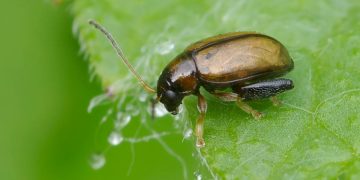#FleaBeetle #CropPests #IntegratedPestManagement #Insecticides #CulturalPractices
Flea beetles, specifically those in the Phyllotreta genus, are notorious crop pests that can cause significant damage to various plant species, including crucifers, potatoes, and eggplants. These small, dark-colored beetles with enlarged hind legs and powerful jumping abilities can defoliate seedlings and young plants, leading to stunted growth, reduced yields, and even death. Given their high reproductive potential and ability to overwinter in soil and plant debris, flea beetle infestations can quickly become a major problem for farmers and gardeners.
Fortunately, there are several effective ways to manage flea beetle populations and prevent or reduce their impact on crops. One approach is to use physical barriers such as row covers, screens, or mesh nets to prevent adult beetles from reaching plants or laying eggs on them. Another option is to apply insecticides, either synthetic or organic, to kill or deter flea beetles. However, care should be taken to choose products that are safe for the environment and beneficial insects, and to follow the label instructions carefully to avoid overuse or misuse.
In addition to these direct control measures, there are several cultural practices that can help minimize flea beetle damage. These include crop rotation, intercropping, sanitation, and timing of planting. By rotating susceptible crops with non-host plants, planting diverse mixtures, removing plant debris, and sowing crops at the optimal time, farmers can reduce the attractiveness and vulnerability of their fields to flea beetles.
The development of integrated pest management (IPM) programs that combine various strategies and techniques tailored to specific crops and regions has also contributed to better flea beetle control and reduced reliance on chemical insecticides. By using a combination of preventive, cultural, biological, and chemical measures, farmers and gardeners can achieve a more sustainable and effective management of flea beetles and other pests.
Flea beetles, especially Phyllotreta spp., are a serious threat to many crops and require proactive and integrated management to prevent or mitigate their damage. By using a combination of physical, chemical, cultural, and IPM strategies, farmers and gardeners can protect their plants and achieve higher yields and quality. So if you notice flea beetle infestation in your crops, don’t panic, but act swiftly and wisely to control it.































